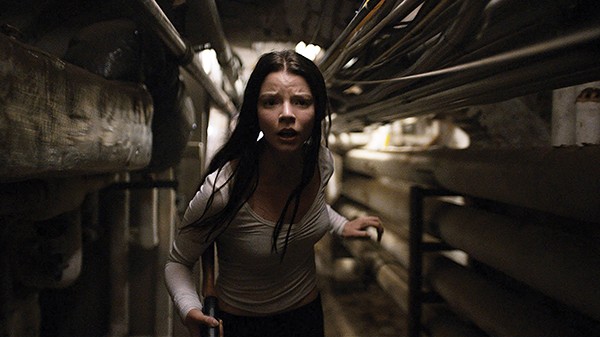The year is 2017, and there is much strangeness in the air: Donald Trump is in the Oval Office, it’s 78 degrees in February, and M. Night Shyamalan made a great movie.
I have never understood the cult of Shyamalan. (It’s been 17 years, so I’m going to just come out and say it: “Bruce Willis is also a ghost!” is a dumb excuse for a plot twist.) Personally, I’ve enjoyed exactly one of his 13 previous films, the stealth superhero story Unbreakable. Unfortunately, that was also the point when the late-story plot twist became cemented as Shyamalan’s gimmick, and his stories, stylishly told as they are, became progressively more pointless. I would peg the nadir of his career around 2008, when he made a movie about nothing happening called The Happening, but fans of the anime series Avatar: the Last Airbender would claim his 2010 evisceration of the franchise as the low point, while financiers who backed Will Smith’s vanity project After Earth would say the director hit rock bottom in 2013.
Maybe the problem all along was that Shyamalan was getting too much money. After Earth cost $130 million. (That it officially returned $244 million and is still considered a huge failure is an insight into everything that’s wrong with 21st century Hollywood.) Split, the current No. 1 movie at the box office, cost $9 million. Maybe Shyamalan just works better under constraints.

Anya Taylor-Joy as Casey, the least popular girl in school
It also seems to help that Split is not a puzzle movie, that nebulous subgenre inspired by The Sixth Sense and Christopher Nolan’s Memento, which rewards the viewer for piecing together the plot from a slow dribble of ambiguous information. Shyamalan has cut loose his signature gimmick in favor of jumping on all of the trends in contemporary horror at once, and throwing in a pinch of Hitch for good measure. When the film opens, Claire (Haley Lu Richardson) and Marcia (Jessica Sula) are waiting on Casey (Anya Taylor-Joy) to get picked up by her family from the restaurant where Claire just had her 16th birthday party. Casey, the least popular girl at school, was invited out of pity, and now Claire has to give her a ride home. But once they’ve piled into the minivan, a stranger gets in the car and renders the girls unconscious with an anesthetic spray. When they wake up, they’re in an underground holding cell. Their kidnapper is revealed to be Dennis (James McAvoy), whose fastened top button and fastidious neat freakery signify dangerous mental instability.
The opening sequence is classic Shyamalan. He uses the banal conformity of suburban America to set a mood of inhuman creepiness and then tosses in slight violations of normality to create tension. Shyamalan movies can sometimes feel like a Skinner box experiment, with a clinical psychologist probing for just the right stimulus to create a fear response. If Split feels more organic, it’s almost entirely because of the pair of killer lead performances from McAvoy and Taylor-Joy. Dennis’ real name is Kevin, a guy suffering from severe dissociative identity disorder, what used to be commonly called schizophrenia or, slightly more accurately, “split personalities.” Kevin’s psyche is divided into 23 personalities, all of whom happen to be over-actors, giving McAvoy an excuse to suck all the juice off the ham bone. It ain’t subtle, but it’s a dazzling display of technique by McAvoy. At one point, when Kevin is talking to his long-suffering shrink Dr. Fletcher (Betty Buckley), McAvoy plays one personality pretending to be another personality while Shyamalan keeps him in tight close-up to catch the fine shading. Taylor-Joy’s performance as the damaged, clever final girl, Casey, is much more conventional. She provides the much-needed straight woman to McAvoy’s antics, showing her character’s innate empathy with her big, expressive eyes.
Split‘s excellent widescreen camera work seems inspired by the ruthless beauty of It Follows, and the claustrophobic plot takes cues from Green Room and 10 Cloverfield Lane. Shyamalan’s greatest strength has always been building individual scenes; sprung from the puzzle movie trap, he is free to riff away. Even a half-hearted “big twist” head fake at the end can’t drag down Split‘s momentum.